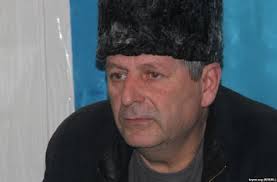Crimean Tatar leader’s detention extended, protest prohibited

A Crimean court has remanded in custody for a further three months Akhtem Chiygoz, deputy head of the Mejlis, or Crimean Tatar representative assembly. A peaceful protest against his arrest was prohibited on grounds as surreal as those for the Crimean Tatar leader’s prosecution.
Chiygoz was initially detained until Feb 19 and the hearing on Wednesday was therefore early. Only 5 people – mainly family – were admitted into the hearing, with the members of the Mejlis and other Crimean Tatars who came to show their support prevented from entering. He has now been detained until May 19.
Akhtem Chiygoz was arrested on Jan 29 on charges relating to a demonstration outside the Crimean parliament before Russia first invaded, then annexed, Crimea. He is accused – under Russian legislation which was not, therefore, in force at the time of the alleged offence of ‘organizing and taking part in mass disturbances’. On Feb 6 an appeal against his detention was rejected. Neither court showed any concern either about the lack of any jurisdiction to continue with the case or the fact that there is ample video footage showing that Chiygoz actively sought to calm protesters, as did other members of the Mejlis present.
A 10-hour search was carried out the following day by the FSB and armed soldiers, during which Chiygoz’s wife was not allowed to admit at least a female neighbour and was treated with immense disrespect.
Another Crimean Tatar activist, Eskender Kantemirov has also been arrested over the demonstration on Feb 26, 2014 and remanded in custody for 2 months.
It seems likely that other arrests will follow.
Two people were reported to have died on Feb 26, 2014, although one of the people apparently died of a heart attack and the other was elderly and may have also been in bad health. There were two demonstrations that day – one organized by Crimean Tatars, and a counter-demonstration by the Russian Unity party run by Sergei Aksyonov. Both he and his party were then extremely marginal in Crimean politics, yet Aksyonov proclaimed himself ‘prime minister’ following a parliamentary ‘session’ under Russian soldiers’ machine guns on Feb 27.
It is typical of the nature of this ‘criminal case’, that only Crimean Tatars are suspected of trouble.
Protest prohibited by Russian law
A demonstration in protest at Chiygoz’s arrest and detention had been planned for Feb 19, the day that the first term of detention was supposed to end, with the notice of a plan to hold the protest lodged well in advance. The Bakhchysarai city authorities responded by claiming that the “application is subject to consideration according to procedure defined by the federal law ‘On the procedure for consideration of appeals from citizens of the Russian Federation”, and cannot be considered by the administrative authorities of Bakhchysarai as grounds for providing permission to hold a public event”.
The notice was lodged on behalf of the Mejlis by Mejlis member Ilmi Umerov. It was not ‘an appeal’, but information about a planned peaceful gathering which even Russian legislation in theory allows. It cannot, however, be said that the ban was unexpected.
Mounting repression
The court extended the deputy head of the Mejlis’ detention to May 19, the day after the seventy first anniversary of the Deportation of the entire Crimean Tatar people from their homeland in 1944. Veteran Crimean Tatar leader Mustafa Dzhemiliev was exiled from Crimea before the seventieth anniversary; the current Mejlis head, Refat Chubarov – two months later. Another Crimean Tatar rights activist Sinaver Kadyrov was recently deported from his home.
Banished Mejlis leader Refat Chubarov reports that there are less and less lawyers in Crimea willing to take on cases initiated by Russia’s FSB or Investigative Commission, especially those involving Crimean Tatars facing repression.
There are ever more such cases, with the Russian occupation regime waging an overt offensive against the Mejlis and any others who dare to speak out against the repression.





